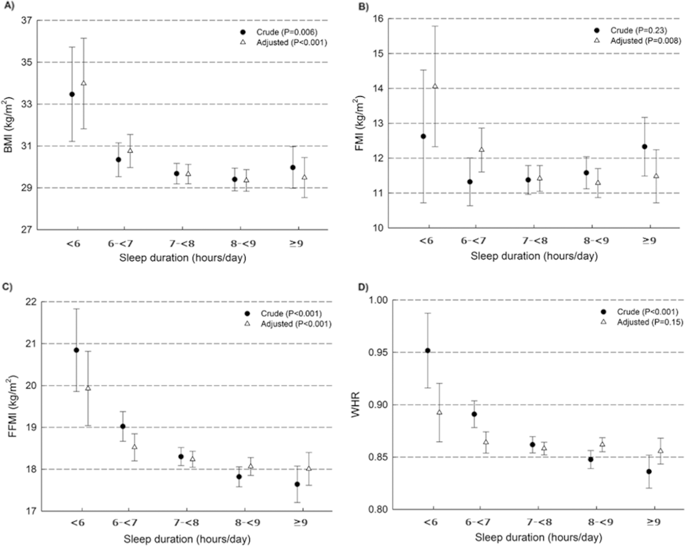International Journal of Obesity ( IF 4.2 ) Pub Date : 2020-01-14 , DOI: 10.1038/s41366-020-0537-3 Sofus C Larsen 1 , Graham Horgan 2 , Marie-Louise K Mikkelsen 1 , Antonio L Palmeira 3 , Sarah Scott 4 , Cristiana Duarte 4 , Inês Santos 3 , Jorge Encantado 3 , Ruairi O' Driscoll 4 , Jake Turicchi 4 , Joanna Michalowska 4 , James Stubbs 4 , Berit L Heitmann 1, 5, 6

|
Background
An association between sleep and obesity has been suggested in several studies, but many previous studies relied on self-reported sleep and on BMI as the only adiposity measure. Moreover, a relationship between weight loss history and attained sleep duration has not been thoroughly explored.
Design
The study comprised of 1202 participants of the European NoHoW trial who had achieved a weight loss of ≥5% and had a BMI of ≥25 kg/m2 prior to losing weight. Information was available on objectively measured sleep duration (collected during 14 days), adiposity measures, weight loss history and covariates. Regression models were conducted with sleep duration as the explanatory variable and BMI, fat mass index (FMI), fat-free mass index (FFMI) and waist-hip ratio (WHR) as response variables. Analyses were conducted with 12-month weight loss, frequency of prior weight loss attempts or average duration of weight maintenance after prior weight loss attempts as predictors of measured sleep duration.
Results
After adjusting for physical activity, perceived stress, smoking, alcohol consumption, education, sex and age, sleep duration was associated to BMI (P < 0.001), with the highest BMI observed in the group of participants sleeping <6 h a day [34.0 kg/m2 (95% CI: 31.8–36.1)]. Less difference in BMI was detected between the remaining groups, with the lowest BMI observed among participants sleeping 8–<9 h a day [29.4 kg/m2 (95% CI: 28.8–29.9)]. Similar results were found for FMI (P = 0.008) and FFMI (P < 0.001). We found no association between sleep duration and WHR. Likewise, we found no associations between weight loss history and attained sleep duration.
Conclusion
In an overweight population who had achieved a clinically significant weight loss, short sleep duration was associated with higher BMI, with similar associations for fat and lean mass. We found no evidence of association between weight loss history and attained sleep duration.
中文翻译:

客观测量的睡眠时间、肥胖和减肥史之间的关联
背景
几项研究表明睡眠与肥胖之间存在关联,但许多先前的研究依赖于自我报告的睡眠和 BMI 作为唯一的肥胖衡量标准。此外,减肥史与达到的睡眠时间之间的关系尚未得到彻底探索。
设计
该研究由欧洲 NoHoW 试验的 1202 名参与者组成,他们在减肥前体重减轻了 ≥5% 并且 BMI ≥25 kg/m 2。可获得关于客观测量的睡眠持续时间(在 14 天内收集)、肥胖测量、减肥史和协变量的信息。回归模型以睡眠时间为解释变量,BMI、脂肪质量指数(FMI)、无脂肪质量指数(FFMI)和腰臀比(WHR)为响应变量。以 12 个月的体重减轻、之前的减肥尝试频率或之前的减肥尝试后体重维持的平均持续时间作为测量睡眠持续时间的预测因素进行了分析。
结果
在调整身体活动、感知压力、吸烟、饮酒、教育、性别和年龄后,睡眠时间与 BMI 相关(P < 0.001),在睡眠 <6 公顷/天的参与者组中观察到的最高 BMI [34.0 kg /m 2 (95% CI: 31.8–36.1)]。在其余各组之间检测到的 BMI 差异较小,在每天睡眠 8-<9 公顷的参与者中观察到的 BMI 最低 [29.4 kg/m 2 (95% CI: 28.8-29.9)]。FMI ( P = 0.008) 和 FFMI ( P < 0.001)也发现了类似的结果。我们发现睡眠时间与 WHR 之间没有关联。同样,我们发现减肥史与获得的睡眠时间之间没有关联。
结论
在临床上显着减重的超重人群中,睡眠时间短与较高的 BMI 相关,与脂肪和瘦体重的相关性相似。我们没有发现体重减轻史与达到的睡眠时间之间存在关联的证据。











































 京公网安备 11010802027423号
京公网安备 11010802027423号